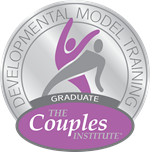Anxiety: Causes, Symptoms, and Treatment Options
/Anxiety is a common mental health condition that affects millions of people worldwide.
It’s a feeling of unease, such as worry or fear, that can be mild or severe.
Anxiety can be caused by a variety of factors, and while many people think it’s linked with genetics or brain chemistry, it is more of a response to life experiences, personal beliefs around self-worth and environmental factors.
While it’s normal to experience anxiety from time to time, persistent and excessive anxiety can interfere with daily activities, quality of life and your relationships.
Understanding anxiety can help reduce stigma and increase awareness about the importance of mental health.
How Your Body Pays The Price For Chronic Anxiety
Bessel van der Kolk - a psychiatrist and author - studies the results of chronic anxiety in people. In his book, The Body Keeps Score, he outlines the result of a person’s body drip feeding stress hormones such as cortisol and adrenaline over months, if not years.
Apart from the discomfort of anxiety, you - or people you know experiencing anxiety (or chronic stress) - may have developed conditions such as:
Irritable Bowel Syndrome
Fibro Myalgia
Food allergies
Lupus
Gut problems
Anxiety is a state where your body lets you know you’re not safe - if you don’t listen to your body, then the build up of toxicity in your system can cause chronic health problems that many medical practitioners don’t have answers for.
What is Anxiety?
Anxiety is a normal reaction to stress that everyone experiences from time to time. However, when anxiety becomes excessive, it can interfere with daily activities and cause significant distress. Anxiety disorders are the most common mental health disorders in the United States, affecting approximately 40 million adults aged 18 and older each year [1].
Types of Anxiety
There are several types of anxiety disorders, including generalized anxiety disorder (GAD), panic disorder, social anxiety disorder, specific phobias, and separation anxiety disorder.
GAD is characterized by excessive and persistent worry about everyday events and activities, while panic disorder involves sudden and unexpected panic attacks.
Social anxiety disorder is marked by intense fear and avoidance of social situations, and specific phobias involve irrational fear of specific objects or situations.
Separation anxiety disorder is a common disorder in children, but it can also occur in adults and is characterized by excessive fear or anxiety about separation from attachment figures [2].
Symptoms and Signs
The symptoms and signs of anxiety disorders can vary depending on the type of disorder.
However, common symptoms include excessive worry or fear, restlessness, irritability, difficulty concentrating, muscle tension, and sleep disturbances.
Individuals with panic disorder may experience sudden and unexpected panic attacks, which can cause symptoms such as rapid heart rate, sweating, trembling, and shortness of breath.
Social anxiety disorder can cause intense fear and avoidance of social situations, while specific phobias can cause extreme fear and avoidance of specific objects or situations [3].
References
Anxiety and Depression Association of America. (n.d.). Understand the Facts. Retrieved November 9, 2023, from https://adaa.org/understanding-anxiety
Psychology Today. (n.d.). Anxiety. Retrieved November 9, 2023, from https://www.psychologytoday.com/us/basics/anxiety
Mayo Clinic. (2021, August 26). Anxiety disorders. Retrieved November 9, 2023, from https://www.mayoclinic.org/diseases-conditions/anxiety/symptoms-causes/syc-20350961
Causes of Anxiety
Anxiety disorders are complex and can be caused by a combination of genetic and environmental factors. Below are two sub-sections that discuss the most common causes of anxiety.
Genetic Factors
Research has shown that anxiety disorders can run in families, suggesting a genetic component to the disorder. According to the Mayo Clinic, people with a family history of anxiety disorders are more likely to develop the condition themselves. Additionally, studies have identified specific genes that may be associated with anxiety disorders.
However, it is important to note that having a genetic predisposition to anxiety does not mean that a person will necessarily develop the disorder. Environmental factors also play a significant role in the development of anxiety.
Environmental Triggers
Environmental factors can trigger anxiety disorders in people who are genetically predisposed to the condition. Calm Clinic explains that stressful life events, such as the death of a loved one, a traumatic experience, or a major life change, can trigger anxiety in some people.
Other environmental factors that can contribute to anxiety disorders include:
Chronic stress
Substance abuse
Certain medications
Chronic medical conditions
Hormonal imbalances
It is important to note that not everyone who experiences these environmental triggers will develop an anxiety disorder. However, they can increase the risk of developing the condition in people who are genetically predisposed to anxiety.
Effects of Anxiety on Mental and Physical Health
Anxiety is a common mental health disorder that affects millions of people worldwide. It can have a significant impact on both mental and physical health.
Mental Health Effects of Anxiety
Anxiety can cause a range of mental health symptoms, including:
Excessive worry and fear
Irritability
Difficulty concentrating
Restlessness
Insomnia
These symptoms can be debilitating and can significantly impact a person's quality of life. Anxiety can also lead to the development of other mental health disorders, such as depression and substance abuse.
Physical Health Effects of Anxiety
Anxiety can also have a range of physical health effects, including:
Rapid breathing or heart rate
Lightheadedness or dizziness
Abdominal pain
Indigestion
Chest pain
Fatigue
Insomnia
Headache
In the short term, anxiety increases a person's breathing and heart rate, which can cause these physical symptoms. However, chronic anxiety can have more severe physical health effects, including an increased risk of heart disease, high blood pressure, and stroke.
It is essential to seek treatment for anxiety to manage both the mental and physical health effects. Treatment options can include therapy, medication, and lifestyle changes. With proper treatment, many people with anxiety can manage their symptoms and improve their quality of life.
Anxiety Management and Treatment
Anxiety is a common mental health condition that affects millions of people worldwide. Fortunately, there are several ways to manage and treat anxiety, including therapy options and medication and supplements.
Medication and Supplements
Medication can be an effective way to manage anxiety. The main options for medication are selective serotonin reuptake inhibitors (SSRIs) and serotonin-norepinephrine reuptake inhibitors (SNRIs) [3]. These medications work by increasing the levels of certain neurotransmitters in the brain that regulate mood.
In addition to medication, there are several supplements that may help manage anxiety. Some of the most popular supplements for anxiety include:
Omega-3 fatty acids [4]
Ashwagandha [5]
Valerian root [6]
It's important to note that while supplements may be helpful, they should not be used as a replacement for medication or therapy. Always talk to a healthcare professional before starting any new supplement regimen.
Overall, managing and treating anxiety requires a combination of therapy, medication, and supplements. It may take some trial and error to find the right combination of treatments that work best for each individual. With the right treatment plan, however, anxiety can be effectively managed and treated.
[1] Mayo Clinic. Anxiety disorders - Diagnosis and treatment. https://www.mayoclinic.org/diseases-conditions/anxiety/diagnosis-treatment/drc-20350967
[2] National Institute of Mental Health. Anxiety Disorders. https://www.nimh.nih.gov/health/topics/anxiety-disorders/index.shtml
[3] UpToDate. Generalized anxiety disorder in adults: Management. https://www.uptodate.com/contents/generalized-anxiety-disorder-in-adults-management
[4] Healthline. 12 Science-Backed Benefits of Omega-3 Fatty Acids. https://www.healthline.com/nutrition/17-health-benefits-of-omega-3
[5] Healthline. 12 Proven Health Benefits of Ashwagandha. https://www.healthline.com/nutrition/12-proven-ashwagandha-benefits
[6] Healthline. Valerian Root: Benefits, Side Effects, and Dosage. https://www.healthline.com/nutrition/valerian-root
Living with Anxiety
Anxiety is a common mental health condition that affects millions of people worldwide. It can interfere with daily life and make it difficult to manage stress and relationships. However, there are ways to cope with anxiety and live a fulfilling life.
Self-Care Tips
Self-care is an essential part of managing anxiety. Here are some self-care tips that can help individuals living with anxiety:
Exercise regularly: Exercise is a powerful stress reducer that can improve mood and overall health. It is recommended to start slowly and gradually increase the amount and intensity of physical activities.
Practice deep breathing: Focused, deep breathing practices can help manage immediate feelings of anxiety. Breathing in for 4 counts and breathing out for 4 counts for 5 minutes can help to reduce anxiety.
Get enough sleep: Sleep is crucial for physical and mental health. It is recommended to aim for 7-8 hours of sleep per night.
Eat a healthy diet: Eating a well-balanced diet can help to manage anxiety symptoms. It is recommended to eat plenty of fruits, vegetables, whole grains, and lean proteins.
Support Systems
Having a support system in place can help individuals living with anxiety to feel less alone and more empowered. Here are some ways to build a support system:
Talk to a therapist: Therapy can be a helpful tool for managing anxiety. A therapist can provide support, guidance, and coping strategies.
Join a support group: Support groups can provide a safe space for individuals to share their experiences and connect with others who are going through similar struggles.
Lean on friends and family: Friends and family can provide emotional support and practical help during difficult times. It is important to communicate openly and honestly with loved ones about anxiety and how they can help.
Living with anxiety can be challenging, but it is possible to manage symptoms and live a fulfilling life. By practicing self-care and building a support system, individuals can take control of their anxiety and thrive.
Frequently Asked Questions
What are the 6 types of anxiety disorders?
According to Psych Central, the six types of anxiety disorders are generalized anxiety disorder (GAD), panic disorder, social anxiety disorder (SAD), obsessive-compulsive disorder (OCD), post-traumatic stress disorder (PTSD), and specific phobias.
What are 5 signs you have anxiety?
Verywell Health suggests that some common signs of anxiety include excessive worry, restlessness, fatigue, difficulty concentrating, and irritability. Other symptoms may include muscle tension, sleep disturbances, and physical symptoms such as sweating or trembling.
How to deal with anxiety?
The Anxiety and Depression Association of America recommends seeking professional care, such as cognitive-behavioral therapy (CBT) or medication. Other strategies may include relaxation techniques, exercise, and avoiding caffeine or alcohol.
What is the best way to deal with anxiety?
The best way to deal with anxiety may vary depending on the individual's specific needs and circumstances. Mayo Clinic suggests that a combination of medication and therapy may be effective for some individuals, while others may benefit from lifestyle changes such as exercise or stress management techniques.
How can I calm my anxiety fast?
Verywell Mind suggests several techniques for quickly calming anxiety, including deep breathing, progressive muscle relaxation, visualization, and mindfulness exercises.
Severe anxiety symptoms
Severe anxiety symptoms may include panic attacks, intense fear or terror, chest pain, difficulty breathing, or feelings of detachment from reality. If you are experiencing severe anxiety symptoms, it is important to seek immediate medical attention.









